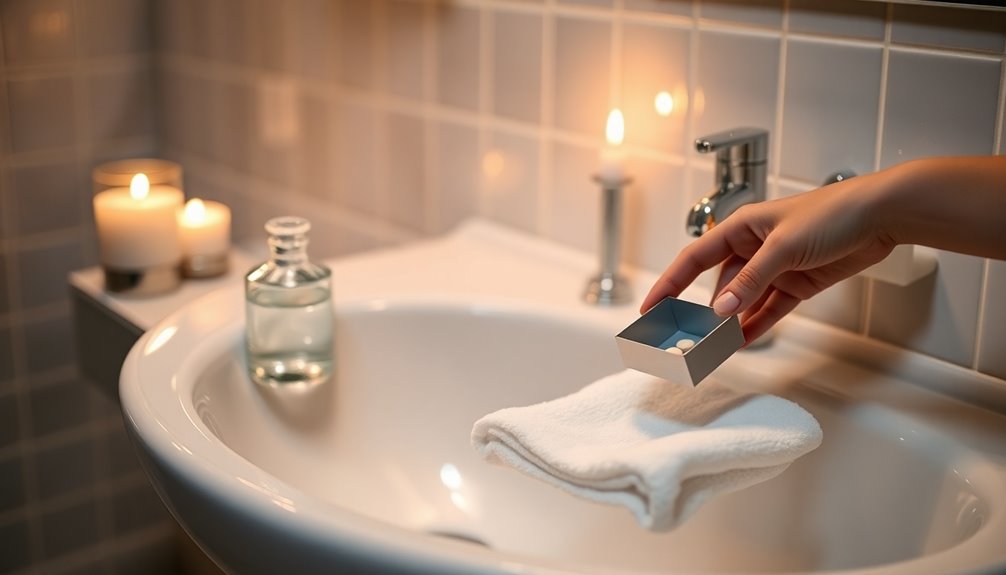If you've had unprotected sex and want to prevent pregnancy, consider emergency contraception. You can use Emergency Contraceptive Pills (ECPs) like Plan B, which are available over-the-counter, or Ulipristal acetate (ella), which requires a prescription. These pills work best when taken within 72 hours but can be effective up to 120 hours after intercourse. Alternatively, the Copper IUD can be inserted by a healthcare provider within five days and has over 99% effectiveness. Don't forget to consult a healthcare professional for guidance and to explore your options further.
Key Takeaways
- Use Emergency Contraceptive Pills (ECPs) like Plan B within 72 hours after unprotected sex to reduce pregnancy risk by 75-89%.
- Consider Ulipristal acetate (ella), effective for up to 120 hours post-intercourse, which requires a prescription.
- The Copper IUD (Paragard) can be inserted by a healthcare provider within five days for over 99% effectiveness.
- Consult a healthcare provider for personalized advice, especially if experiencing unusual symptoms or if a period is missed.
- Emergency contraception does not terminate an existing pregnancy and should not replace regular contraceptive methods.
Understanding Emergency Contraception

Understanding emergency contraception is essential if you've had unprotected sex and want to prevent pregnancy.
Emergency contraception (EC) can be your go-to solution, especially when taken within 72 hours after intercourse, though it can still work up to 120 hours later.
The most common option is the morning-after pill, like Plan B, which you can get over-the-counter.
There's also ulipristal acetate (ella), available via prescription.
If you're looking for a more long-term method, the copper IUD (Paragard) is a highly effective choice that can be inserted by a healthcare provider within five days after unprotected sex.
Types of Emergency Contraception
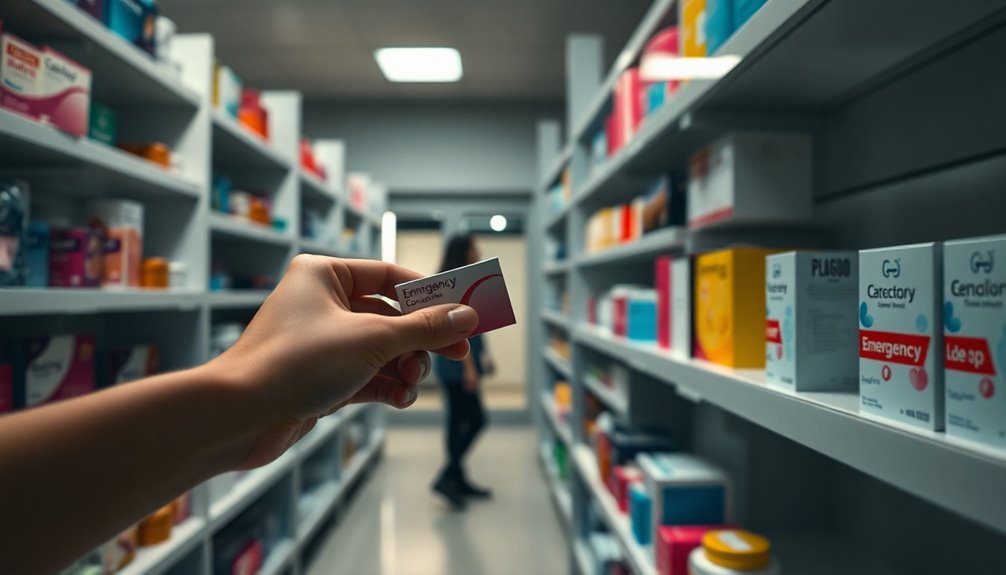
If you've decided on emergency contraception, it's important to know the different options available to you. Here are the main types of emergency contraception:
| Type of Contraception | Time Frame |
|---|---|
| Emergency Contraceptive Pills (Plan B) | Within 72 hours |
| Emergency Contraceptive Pills (Ella) | Within 120 hours |
| Copper IUD | Up to 5 days |
Emergency contraceptive pills (ECPs) like Plan B and Ella help prevent pregnancy by delaying ovulation. Plan B is available over-the-counter, while Ella requires a prescription. The Copper IUD, inserted by a healthcare provider, boasts over 99% effectiveness. Remember, ECPs don't terminate an existing pregnancy and don't protect against STIs, so choose wisely!
How Emergency Contraception Works
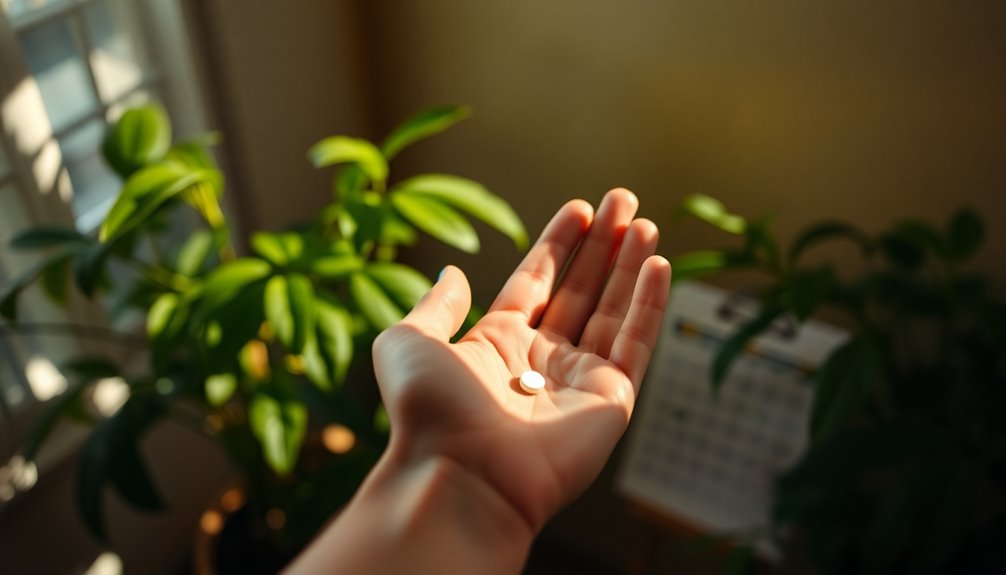
Emergency contraception (EC) primarily works by delaying or inhibiting ovulation, ensuring that an egg isn't released from the ovary.
When you take EC, it can help prevent pregnancy in essential ways:
- It can be taken up to 120 hours after unprotected sex, giving you a chance to act.
- Ulipristal acetate (ella) is effective for a longer period compared to other options.
- It doesn't terminate an existing pregnancy, focusing solely on preventing ovulation.
Effectiveness of Emergency Contraception
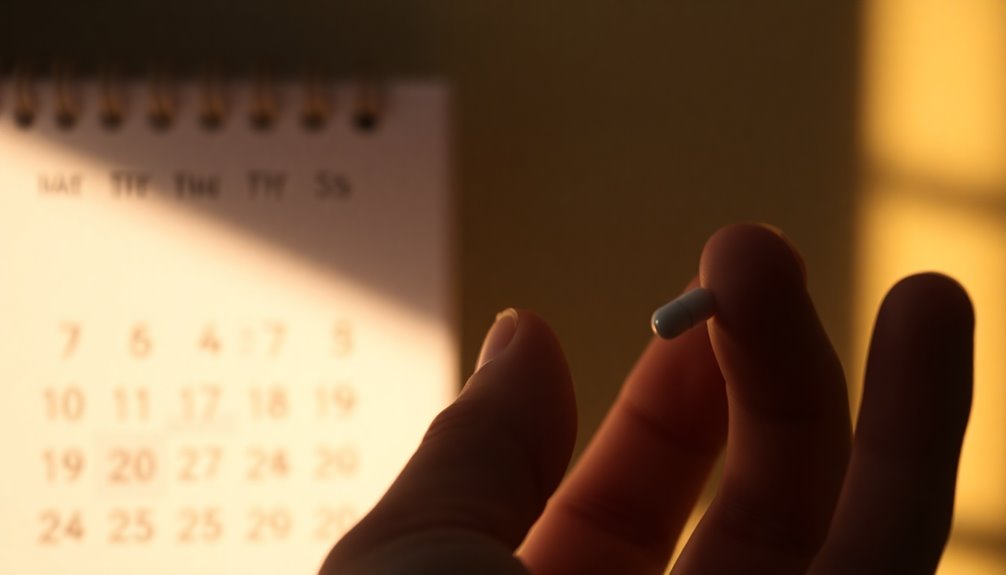
When it comes to emergency contraception, timing is essential.
You'll find that taking emergency contraceptive pills (ECPs) within 72 hours after unprotected sex gives you a failure rate of just 1-2%.
Wait longer, and the effectiveness drops considerably, though you can still use them up to five days post-intercourse for some level of protection.
Timing of Intake
Timing is essential for the effectiveness of emergency contraception, as it works best the sooner you take it after unprotected sex.
Here's what you need to know:
- 72 Hours: Taking emergency contraception within this window offers a 1-2% failure rate, ensuring higher effectiveness.
- 120 Hours: You can take it up to 5 days post-intercourse, but the effectiveness drops considerably.
- Copper IUD: This option can be inserted within 5 days and boasts over 99.9% effectiveness.
Failure Rate Statistics
The effectiveness of emergency contraception can be clearly understood through its failure rate statistics.
When you take emergency contraception pills (ECPs) within 72 hours after unprotected sex, the failure rate is just 1-2%, making them highly effective. However, this effectiveness drops after 72 hours, even though you can still use them up to 120 hours (5 days) post-intercourse, where the failure rate may increase.
On the other hand, the Copper IUD boasts an impressive over 99.9% effectiveness when inserted by a healthcare provider within 5 days of unprotected sex.
Studies show that ECPs can reduce the risk of pregnancy by 75-89% when used as directed, but remember, they won't prevent pregnancy from any future unprotected sex.
Side Effects and Considerations
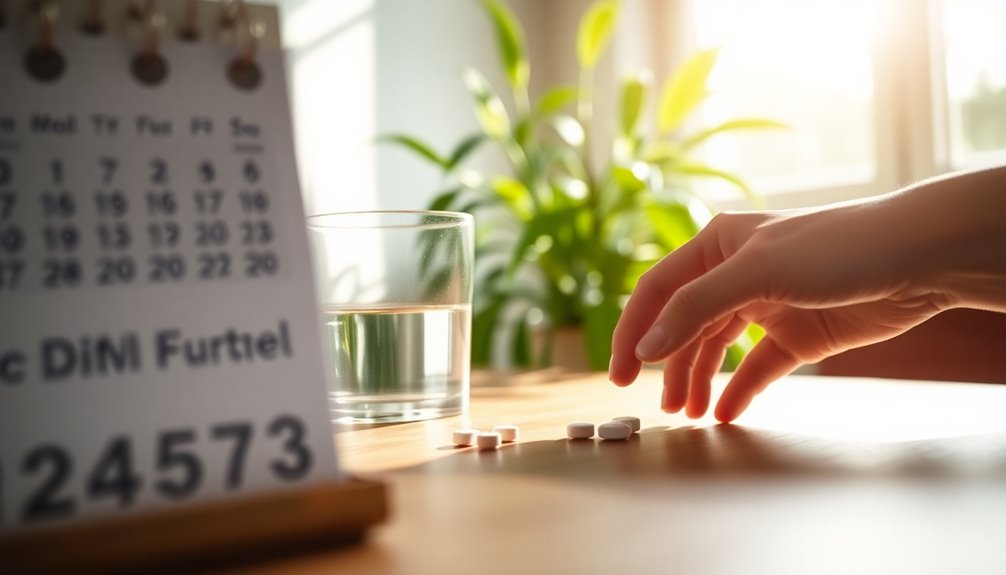
When considering emergency contraception, you should be aware of potential side effects like nausea and menstrual changes.
Timing is essential, as the effectiveness can vary based on when you take the pills.
It's always a good idea to consult a healthcare provider if you have concerns or experience unusual symptoms after use.
Common Side Effects
Although most people tolerate emergency contraception (EC) well, it's important to be aware of potential side effects. While these side effects are usually mild and resolve within 1-2 days, they can still be concerning.
Here are some common side effects you might experience:
- Nausea or vomiting
- Breast tenderness
- Headaches
You may also notice spotting or changes in your next menstrual period, along with fatigue or dizziness.
If you experience heavy bleeding or prolonged irregularities, it's essential to consult a healthcare professional.
Effectiveness Timing Importance
Taking emergency contraception (EC) as soon as possible after unprotected sex considerably boosts its effectiveness in preventing pregnancy.
Ideally, you should take it within 72 hours, as the failure rate drops to just 1-2% when used promptly. While EC can be taken up to 120 hours later, the timing is vital for maximizing its effectiveness.
Remember, potential side effects like nausea, fatigue, headaches, and menstrual irregularities might occur, but they usually resolve within 1-2 days.
If your period is more than a week late after taking EC, it's important to check for a possible pregnancy.
Keep in mind, EC doesn't protect against sexually transmitted infections and isn't meant for regular contraceptive use.
Consultation With Healthcare Provider
After using emergency contraception, it's important to consult a healthcare provider to discuss any side effects you might experience, like nausea or headaches. This consultation can help guarantee you understand your options and any risks involved.
Here are a few considerations to keep in mind:
- Side Effects: You might face nausea, fatigue, or headaches—knowing this can ease your worries.
- Medication Interactions: Disclose any medications you're taking, as some can affect the effectiveness of emergency contraception.
- Follow-Up: If your period's more than a week late, schedule a follow-up consultation to rule out pregnancy.
Your healthcare provider can offer personalized advice and guidance on ongoing contraceptive options, helping you prevent future unplanned pregnancies.
Accessibility and Cost

Accessing emergency contraception (ECP) can be straightforward, but it often depends on where you live. Options like Plan B and ella are available over-the-counter at many pharmacies, though some areas require a prescription for ella.
The cost of these ECPs ranges from $15 to $70, and many health insurance plans cover them, making them more affordable. If you're considering the Copper IUD, keep in mind it must be inserted by a healthcare professional, resulting in a higher upfront cost, though it provides long-term contraception.
Accessibility varies; some states allow pharmacists to dispense ECPs without a prescription, while others do not. Additionally, clinics may offer ECPs at reduced or no cost, enhancing accessibility for those with financial constraints.
Consulting a Healthcare Provider
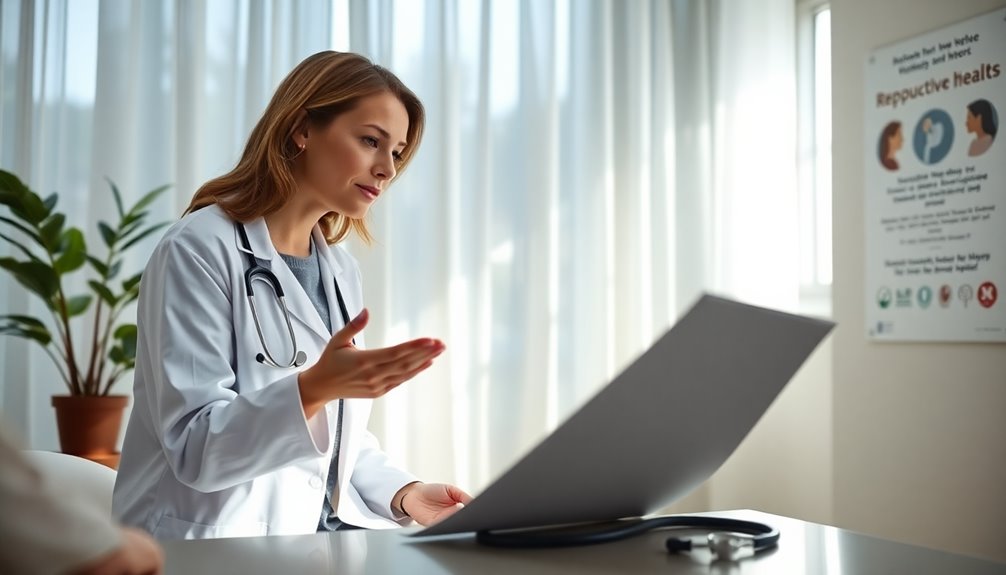
Once you've considered your emergency contraception options, consulting a healthcare provider can help you make informed decisions tailored to your needs.
They'll assess the best method for you, whether it's the morning-after pill or a copper IUD, based on your health and timing.
Here are three key reasons to consult:
- Personalized Advice: Get tailored recommendations on emergency contraception and ongoing options to prevent pregnancy.
- Side Effects Management: Learn about potential side effects and how to handle them effectively.
- Reproductive Health Knowledge: Stay informed through regular check-ups about your options and concerns, like missed periods after using emergency contraception.
Don't hesitate—reach out to a healthcare provider for support and guidance.
Frequently Asked Questions
Is There Anything I Can Do After Sex to Stop a Pregnancy?
After sex, you might wonder what options are available to prevent a possible pregnancy.
Taking emergency contraception pills like Plan B or ella within 72 to 120 hours can be effective.
If you visit a healthcare provider, they can insert a Copper IUD within five days, offering over 99% effectiveness.
How Can I Make Pregnancy Less Likely After Sex?
When it comes to making pregnancy less likely after sex, think of it like a race against time. You have options!
Taking emergency contraceptive pills (ECPs) like Plan B within 72 hours can help, but the sooner, the better.
Alternatively, a copper IUD can be inserted by a healthcare provider up to five days later.
For the future, consider consistent use of regular contraceptive methods to keep those unplanned surprises at bay.
How Can I Stop Pregnancy After Sex Permanently?
If you're looking to stop pregnancy permanently, consider sterilization methods like a vasectomy or tubal ligation. Both options offer over a 99% effectiveness rate.
It's important to be sure about your decision since these procedures aren't easily reversible.
You might also explore long-term options like IUDs for emergency contraception if you act within five days.
Make sure to consult a healthcare provider to discuss what's best for your individual needs and future plans.
Can You Still Prevent Pregnancy After Sex?
Like a safety net under a tightrope walker, there are ways you can still prevent pregnancy after unprotected sex.
You've got options like emergency contraception pills, which work best within 72 hours, or a Copper IUD, effective up to five days later.
Just remember, these methods delay ovulation or prevent fertilization; they won't terminate an existing pregnancy.
If you miss your period, take a pregnancy test to be sure.
Conclusion
In the whirlwind of life, unexpected moments can catch you off guard, but emergency contraception offers a safety net when you need it most. By understanding your options and acting swiftly, you can regain control over your reproductive choices. Think of it as a second chance, a guiding star in a cloudy sky. Don't hesitate to consult a healthcare provider; they can illuminate your path and help you navigate the journey ahead with confidence and clarity.

